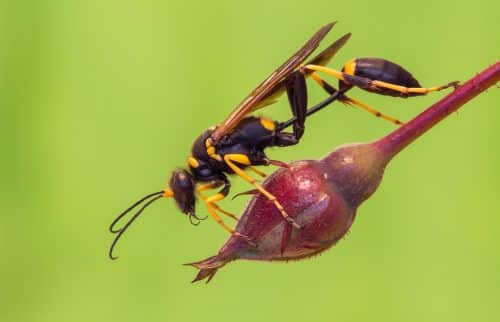There are social wasps and then there are solitary wasps. Solitary wasps may look big, nasty and scary, but they’re actually great for the environment, controlling other pest populations and would rather hunt for their next meal versus annoying humans.
Although social wasps can grow up to two-inches in length, and have a stinger on their thorax, they are actually not aggressive, but they will sting if they feel threatened or are mishandled.
Types of solitary wasps
These species are considered solitary wasps because the females will create their own independent home within the colony. They do not rely on other members of the colony for food or to build shelter.
Common types of solitary wasps include:
- Spider wasps
- Mud daubers
- Digger wasps
- Cicada killers
- Potter wasps
Solitary wasp behavior
Like many insects, springtime is for mating and nest construction, which will include at least one or more cells for “home.” Once eggs are laid, it takes no more than three weeks for them to mature into adults.
- Spider wasps burrow in the ground and provision their nests with spiders, which they hide until the nest is completed. Different types of spider wasps may choose to hunt different types of spiders.
- Potter wasps build tiny jug-shaped mud nests attached to twigs or structures and bring caterpillars to the nest for food.
- Mud daubers build a variety of nests including organ-pipe nests, commonly found under decks, on the side of barns and other dry areas. Globular nests will hang from branches, roof lines, under eaves and are built by the black and yellow mud dauber.
- Digger wasps live up to their name and build burrows in the soil.
- Cicada killers are the most spectacular of the solitary wasp group because of their large size and unusual prey, i.e., cicadas.
The shape, size and color of solitary wasps can be alarming to some people, but it’s good to understand that these insects are actually beneficial to controlling other pest populations. They are avid hunters and will track down spiders, crickets and beetles, but they also like the sweet taste of nectar and pollen.
Control and Extermination Methods of Solitary Wasps:
Potter wasps and mud daubers can be eliminated by removing their nest; however, if the nest is more than a few tubes, it would be a good idea to contact the professionals. Although these wasps are usually non-aggressive, they can still sting if threatened.
If digger wasps, cicada killers or spider wasps are becoming a nuisance, contact a professional pest company to address the situation. The pros at United Pest & Turf Control are trained to understand the habits and behaviors of these pests and will provide a solution that is safe and effective.
Are Solitary Wasps Scary in North Alabama and Southern Tennessee?
Serving North Central Alabama and South Central Tennessee
Limestone County
Ardmore
Home » Are Solitary Wasps Scary?


